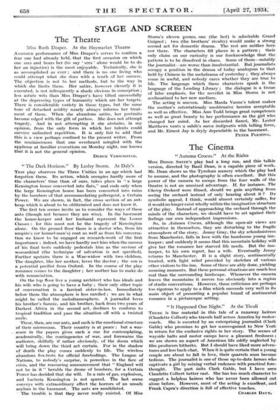" The Dark Horizon." By Lesley Storm. At Daly's Tins
play observes the Three Unities in an age which had forgotten them. Its action, which occupies hardly more of the characters' time than of ours, takes place in " a large Kensington house converted into flats," and ends only when the large Kensington house has been converted into ruins by the bombers of that accommodating poltergeist, a Certain Power. We are shown, in fact, the cross section of an ant- heap which is about to be obliterated and does not know it.
The first ten scenes invite us to consider the ways of these ants (though not because they are wise). In the basement the house-keeper and her husband represent the Lower Classes : for this must not be the tragedy of Kensington alone. On the ground floor there is a doctor who, from his umpire's (or kennel-man's) coat as well as from his conversa- tion we know to be engaged on research-work of the first importance ; indeed, we have hardly met him when the success of his final tests suddenly pedestals him as the saviour of womankind (the technique of salvation is not specified). Further upstairs there is a War-widow with two children. The daughter, like her mother, loves the doctor ; the son is a potential pacifist from Oxford. In the course of the play romance comes to the daughter ; her mother has to make do with renunciation.
On the top floor live a young architect who has ideals and his wife who is going to have a baby ; their only other topic of conversation is a farcical sister-in-law. Immediately below them the atmosphere is less rarefied ; we are in what might be called the melodramosphere. A journalist loves his brother's fiancee, and his brother, back from two years of Darkest Africa in the second act, declines to conform to tropical tradition and pass the situation off with a twisted smile.
These, then, are our ants, and such is the emotional structure of their microcosm. Their country is at peace ; but a war-
- scare in the papers gives each a cue for contemplating, academically, the contingencies of war, and forewarns the audience, skilfully if rather obviously, of the doom which will bring down the third act curtain. For in the shadow of death the play comes suddenly to life. The wireless abandons fox-trots for official forebodings. The League of Nations, to nobody's surprise, is powerless in the face of crisis, and the reassuring announcement that " England will not be in it " heralds the drone of bombers, for a Certain Power has decided that she will. In a rain of gas, explosives, and bacteria Kensington is not spared. The last scene conveys with extraordinary effect the horrors of an unsafe asylum in the basement. The ants are annihilated.
• The trouble is that they never really existed. Of Miss Storm's eleven §cenes, one (the last) is admirable Grand Guignol ; two (the brothers' rivalry) would make a strong second act for domestic drama.. The rest are neither here nor there. The characters fill places in a pattern ; their only claim on our curiosity is our foreknowledge that the pattern is to be dissolved in chaos. Some of them—notably. the journalist—are worse than insubstantial. But journalists occupy a position in the drama of today analogous to that held by Chinese in the melodrama of yesterday ; they.always come in useful, and nobody cares whether they are true to life. The language which, these characters speak is the language of the Lending Library ; the dialogue is a tissue of false emphasis, for the novelist in Miss Storm is not acclimatized to her new medium.
The acting is uneven. Miss Marda Vanne's talent makes the mother's ostentatiously unobtrusive heroics acceptable as well as effective. Miss Ann Todd brings great c9mpetence as well as great beauty to her performance as the girl who changed her mind. As her discarded fiancé, Mr. Lester Matthews vents a sahib's saeva indignatio with telling force, and Mr. Ernest Jay is dryly dependable in the basement.
PETER FLEMING.












































 Previous page
Previous page